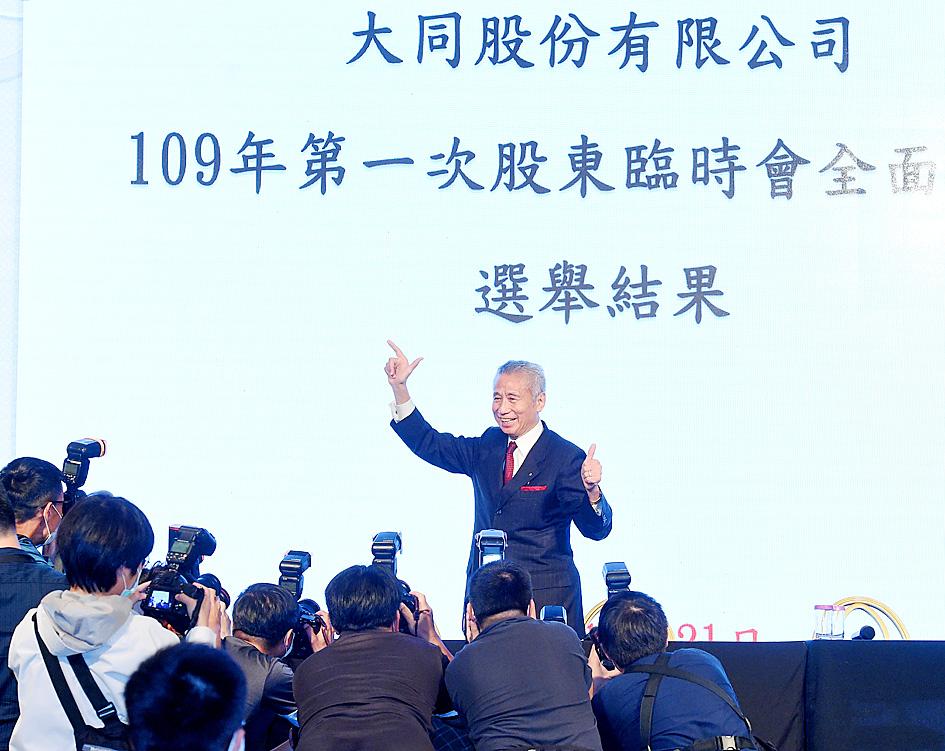Activist investors led by Shanyuan Group (三圓建設) chairman Wang Kuang-hsiang (王光祥) won seven seats on Tatung Co’s (大同) nine-member board at an extraordinary shareholders’ meeting in Taipei yesterday, ending the founding Lin (林) family’s 102-year control.
With approval from the Ministry of Economic Affairs, institutional shareholders held the special meeting to elect new board members, nearly four months after Tatung deprived 27 investors owning a combined 53 percent stake in the firm of their voting rights at a shareholders’ meeting on June 30.
Shareholders with a combined 92.34 percent stake, or 2.03 billion shares, showed up to vote or had placed their ballots via an electronic voting platform operated by Taiwan Depository and Clearing Corp (台灣集保), said Hsin Tung Investment Consultancy Co (欣同) chairman Lin Hung-hsin (林宏信), who chaired the meeting.

Photo: Chu Pei-hsiung, Taipei Times
Candidates appointed by institutional investors won seven seats, including two independent director seats, with leading activist investors Wang, Lin Hung-hsin and Eastern Broadcasting Co (東森電視) chairman Lin Wen-yuan (林文淵) elected as new board directors and garnering 1.43 billion, 1.42 billion and 1.42 billion votes respectively.
Tatung-appointed candidates won two seats, with Tatung chairwoman Lin Kuo Wen-yen (林郭文艷) receiving 1.3 billion votes to stay on the board and James Wang (王金來), a former chairman of Ernst & Young Taiwan, gaining 2.29 billion votes, the highest tally, to take the third independent director seat.
The firm is to hold an extraordinary board meeting on Wednesday next week at the earliest to elect a new chair, Wang Kuang-hsiang told a news conference yesterday.
“We will support Lin Wen-yuan as the new chairman and hope to make Tatung prosperous for the next century,” Wang said.
Lin Kuo, who took over as chairwoman in February 2018 when her husband, Lin Wei-shan (林蔚山), stepped down over a corporate scandal, feared institutional investors might sell the firm’s properties, while the board election was held under unresolved suspicions of Chinese involvement.
“I will continue to protect Tatung as a matter of Taiwanese national security,” Lin Kuo said.
Stephen Wu (吳志光), a lawyer at Lee and Li Attorneys-at-Law (理律法律事務所), said that her decision to stay on the board was unusual.
Many in such a scenario would concentrate on winning the independent director seats, as they can curb bad decisions proposed by a rival party, he said.
“It seems that Lin Kuo has decided to fight until the last minute ... staying on the board might enable her to do something more if the FSC [Financial Supervisory Commission] finds signs of Chinese influence in the firm again,” Wu said.
The Securities and Futures Investors Protection Center is to continue its lawsuit against Lin Kuo, even though company shareholders elected a new board, and if the agency wins, Lin Kuo would be barred from serving on the board.

The Ministry of Foreign Affairs (MOFA) yesterday said it is closely monitoring developments in Venezuela, and would continue to cooperate with democratic allies and work together for regional and global security, stability, and prosperity. The remarks came after the US on Saturday launched a series of airstrikes in Venezuela and kidnapped Venezuelan President Nicolas Maduro, who was later flown to New York along with his wife. The pair face US charges related to drug trafficking and alleged cooperation with gangs designated as terrorist organizations. Maduro has denied the allegations. The ministry said that it is closely monitoring the political and economic situation

Conflict with Taiwan could leave China with “massive economic disruption, catastrophic military losses, significant social unrest, and devastating sanctions,” a US think tank said in a report released on Monday. The German Marshall Fund released a report titled If China Attacks Taiwan: The Consequences for China of “Minor Conflict” and “Major War” Scenarios. The report details the “massive” economic, military, social and international costs to China in the event of a minor conflict or major war with Taiwan, estimating that the Chinese People’s Liberation Army (PLA) could sustain losses of more than half of its active-duty ground forces, including 100,000 troops. Understanding Chinese

UNRELENTING: China attempted cyberattacks on Taiwan’s critical infrastructure 2.63 million times per day last year, up from 1.23 million in 2023, the NSB said China’s cyberarmy has long engaged in cyberattacks against Taiwan’s critical infrastructure, employing diverse and evolving tactics, the National Security Bureau (NSB) said yesterday, adding that cyberattacks on critical energy infrastructure last year increased 10-fold compared with the previous year. The NSB yesterday released a report titled Analysis on China’s Cyber Threats to Taiwan’s Critical Infrastructure in 2025, outlining the number of cyberattacks, major tactics and hacker groups. Taiwan’s national intelligence community identified a large number of cybersecurity incidents last year, the bureau said in a statement. China’s cyberarmy last year launched an average of 2.63 million intrusion attempts per day targeting Taiwan’s critical

‘SLICING METHOD’: In the event of a blockade, the China Coast Guard would intercept Taiwanese ships while its navy would seek to deter foreign intervention China’s military drills around Taiwan this week signaled potential strategies to cut the nation off from energy supplies and foreign military assistance, a US think tank report said. The Chinese People’s Liberation Army (PLA) conducted what it called “Justice Mission 2025” exercises from Monday to Tuesday in five maritime zones and airspace around Taiwan, calling them a warning to “Taiwanese independence” forces. In a report released on Wednesday, the Institute for the Study of War said the exercises effectively simulated blocking shipping routes to major port cities, including Kaohsiung, Keelung and Hualien. Taiwan would be highly vulnerable under such a blockade, because it